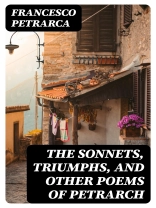In ‘The Sonnets, Triumphs, and Other Poems of Petrarch, ‘ Francesco Petrarca showcases a poetic vision that intertwines themes of love, nature, and mortality through a masterful use of the sonnet form. Written during the early 14th century, this collection not only reflects the profound emotional struggles of the poet but also marks a pivotal moment in the evolution of Italian poetry. Petrarca’s lyrical style is celebrated for its intricate rhyme schemes and eloquent imagery, which meld personal reflection with universal themes, thereby laying the groundwork for the Renaissance’s humanist ideals. Francesco Petrarca, often deemed the ‘Father of Humanism, ‘ was deeply influenced by his love for Laura, a muse whose elusive beauty haunts his verses. His extensive travels and intellectual pursuits exposed him to Classical antiquity, leading him to reconcile medieval thought with ancient wisdom. This biographical backdrop enriches the themes prevalent in his work, as Petrarca navigates the intricate dance between desire and despair, embodying the complexities of the human experience. This collection is essential reading for those seeking to understand the roots of lyric poetry and the rich tapestry of human emotion. Petrarca’s innovative style set a benchmark for subsequent poets, and his exploration of love resonates timelessly. Readers will find both solace and challenge in his verses, thus inviting a deeper engagement with the complexities of love and existence.
लेखक के बारे में
Francesco Petrarca (1304–1374), known in English as Petrarch, was an Italian scholar, poet, and one of the earliest humanists. His work as a writer and his contributions to the Italian language were so profound that he is often called the ‘Father of Humanism.’ Petrarch’s rediscovery of Cicero’s letters is often credited with initiating the 14th-century Renaissance and the subsequent development of the Renaissance humanism that spread across Europe. His sonnet sequence, ‘Canzoniere’ (‘The Sonnets’), alongside ‘Triumphs’ (‘Trionfi’), and other poems, significantly influenced the literary world. His verses focused on love, duality of life, humanism, and philosophical introspection, which were revolutionary and set a milestone for the development of the modern Italian language. Notably, his passionate sonnets dedicated to Laura de Noves, although idealistic, provided a new way to depict love and inner conflict. His writing incorporated his classical education and fused it with vernacular language, bringing literature to a wider audience—a hallmark of humanistic principles. Petrarch’s legacy is vast, influencing writers such as Shakespeare and Chaucer, and enduring within the fabric of Renaissance literature. His works continue to be regarded as masterpieces of lyrical poetry, and his intellectual pursuits embody the spirit of the age that reshaped European thought and art.












